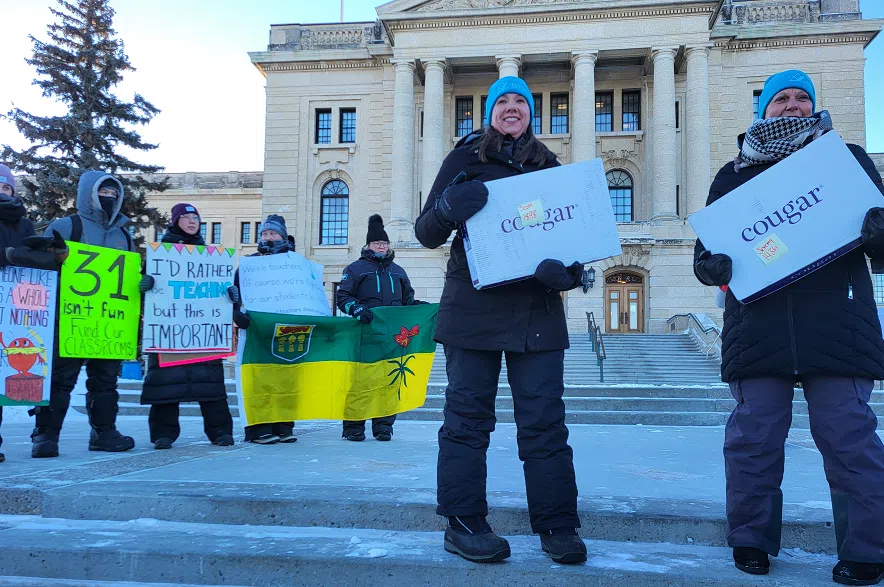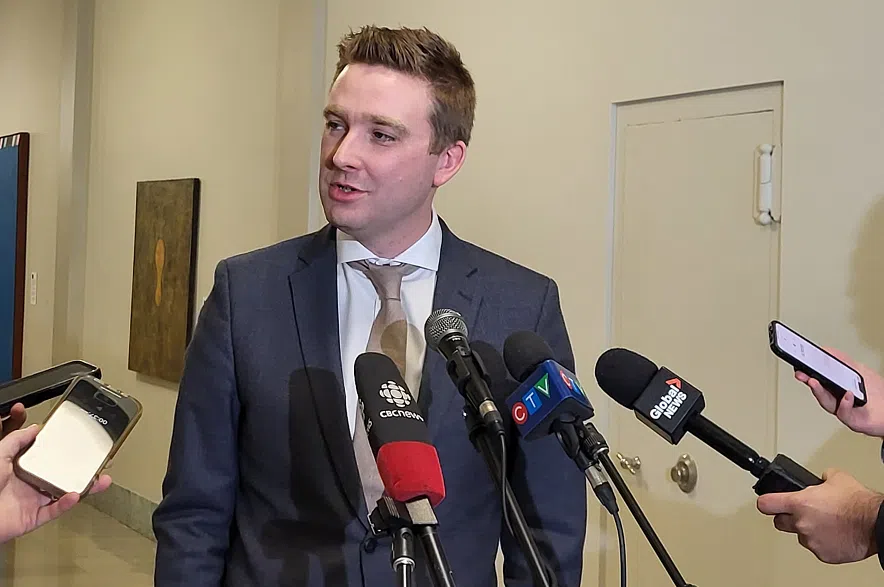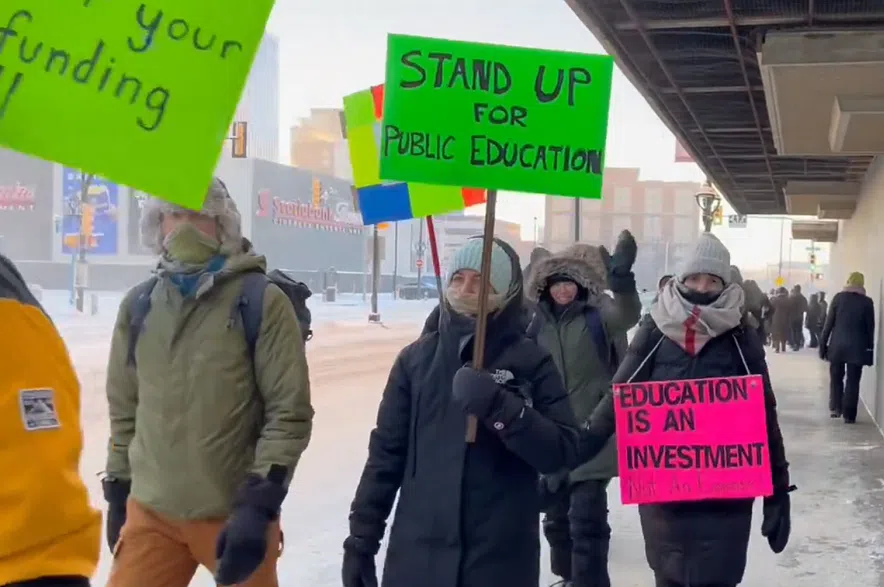Saskatchewan teachers are set to begin rotating strikes this week, as contract negotiations with the provincial government remain stalled.
Samantha Becotte, president of the Saskatchewan Teachers’ Federation, made the announcement during a virtual news conference on Monday.
Rotating strikes mean different divisions will take to the picket lines on different days.
The first full-day strike will be held on Thursday, including all schools in the Holy Trinity, Horizon, Prairie South, Prince Albert Catholic, Saskatchewan Rivers, Light of Christ and Living Sky divisions, plus Sakewew High School in North Battleford.
The union said Thursday’s strike will also include conseil des écoles fransaskoises schools within the area of the striking school divisions, along with teachers in that area working for the Saskatchewan Distance Learning Centre.
Becotte said Saskatchewan residents have sent more than 30,000 emails to the government in recent weeks, but it doesn’t seem to be having any impact.

Samantha Becotte, president of the Saskatchewan Teachers’ Federation, pickets with teachers in front of the Legislative Building in Regina during a single-day teacher strike on Jan. 16, 2024. (Daniel Reech/980 CJME)
Becotte said she was disappointed she had to announce another strike on Monday.
“This is not how negotiations should be,” she said.
Becotte said negotiations started in May with the expectation and commitment to come to the table “in good faith.” She said that would mean a back-and-forth discussion with all parties involved with a goal to come to an agreement that is satisfactory for the province, school boards and teachers.
“The Sask. Party government has at every opportunity chosen to take a different route,” she said. “Over 10 days of bargaining, five days of conciliation, several rallies through the fall, over 30,000 emails this month, thousands of phone calls, and two days of (a) provincewide strike, this government continues to refuse to negotiate on the items most important to teachers.
“Not only did they refuse to negotiate with teachers, the majority of (the) Sask. Party government seems to be missing in action over the last couple of weeks,” she added, noting many teachers reported to the STF that their MLA constituency offices were closed on the last two days of strike action.
“The Government-Trustee Bargaining Committee’s position that class complexity cannot be bargained has been shown to be unfounded. Not only do many provincial teacher organizations across Canada have items on class complexity in their collective agreements, several conciliators and mediators have reported that these items can be bargained in Saskatchewan.”
The 13,500 teachers the union represents are working to negotiate a new collective bargaining agreement with the provincial government, but talks have been stalled for some time.
Teachers previously walked off the job for a single-day strike on Jan. 16, and a second day-long strike was held last Monday.
In addition to a pay raise, the union is seeking stipulations on class size and classroom composition – the number of students who require additional attention or support – to be built into the new contract. The union said per-student funding has declined substantially in Saskatchewan over recent years, leaving teachers to do more work with less funding and support.
Jeremy Cockrill, Saskatchewan’s education minister, has remained steadfast that class size and complexity should be addressed by local school divisions rather than being built into a contract, as there are different situations all over the province.
The government has also launched two pilot programs aiming to help create solutions to the issues, and said it is providing $53.1 million in additional funding to address issues around enrolment, complexity, specialized support classrooms and a new fund to support innovative ideas brought forward by teachers.

Jeremy Cockrill, Saskatchewan’s education minister, speaks to reporters in Regina. (Daniel Reech/980 CJME)
A statement from the Ministry of Education said the government’s bargaining committee has put forward an initial offer for teachers with a seven per cent raise over three years to ensure Saskatchewan teachers remain paid above the Western Canadian average.
“Outside of the collective bargaining process, the Government of Saskatchewan have said we are actively working to address concerns around class size and complexity and we are doing exactly what we said we would with a $53.1-million investment towards enrolment and complexity, a teacher-led innovation and support fund, and specialized support classroom pilot projects,” the statement said.
“A fair deal for teachers must also be a fair deal for taxpayers. Saskatchewan taxpayers already contribute the most per capita to education in the country and right now the Saskatchewan Teachers’ Federation is asking for a salary increase of two per cent plus the Consumer Price Index each and every year, for four years. That amounts to a 23.4 per cent increase. We also know that affordability is top of mind for families right now, which is why a fair deal for teachers must also be a fair deal for taxpayers.”
According to the province, the GTBC remains at the table and is ready to discuss competitive salary and benefits but can’t negotiate without the STF at the table.
Both sides have been accusing the other of walking away from negotiations, with the government saying it’s still at the table and willing to bargain, and the union saying it’ll return to the table once the government says it is willing to build class size and complexity into a new contract.
“Teachers want to be in their classrooms supporting students, but government is making that untenable,” Becotte added.
“There are many factors at play when selecting our next course of action, and we appreciate how this situation impacts people. Teachers are strong in our resolve, and support throughout our communities and across Canada has been so important.”
EDITOR’S NOTE: This is an amended version of this story, adding a school division that was missed in the initial story.











